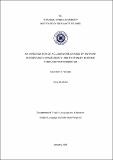DSpace Repository
AN INVESTIGATION OF A CLOCKWORK ORANGE BY ANTHONY BURGESS AND A SPACE ODSSEY :2001 BY STANLEY KUBRICK THROUGH POSTMODERNISM
JavaScript is disabled for your browser. Some features of this site may not work without it.
| dc.contributor.author | DUMAN, Silva
|
|
| dc.date.accessioned | 2021-04-28T12:20:25Z | |
| dc.date.available | 2021-04-28T12:20:25Z | |
| dc.date.issued | 2021 | |
| dc.identifier.uri | http://hdl.handle.net/11547/7475 | |
| dc.description.abstract | A Clockwork Orange and 2001: A Space Odyssey films by Stanley Kubrick have been the examples of postmodernism in the history of cinema. The film adaptation of A Clockwork Orange from the groundbreaking novel by Anthony Burgess and 2001: A Space Odyssey both bears the traces of postmodernism by highlighting individuality and self-consciousness, by reflecting the role of history in the evolution of human mind and capacity. Both A Clockwork Orange and 2001: A Space Odyssey bear the traces of postmodernism blended with Kubrick’s scepticism against the authority. In a near future dystopia, A Clockwork Orange draws a portrait of a corrupted youth culture by utilizing the black satire. In this exaggerated display of violence, the protagonist teenager Alex, and his droogs choose to be evil and the reader encounters a violence ranging from vicious rape to robbing. After becoming a victim of the state’s Reclamation Treatment (the Ludovico Technique), Alex is devoid of free will due to the brainwashing. Having been obliged to watch violence by his favourite composer, Beethoven, Alex feels nausea whenever he thinks of committing violence. Kubrick narrates this black parody with his own cinematographic language perfectly. The literary work launches an important debate about the freedom of choice and individuality highlighting the clash between the individual and society. In a postmodern film adaptation Kubrick narrates the long journey of humanity starting from the early ages to the Jupiter mission in 2001: A Space Odyssey. Even though the tools and machines man uses alter, human’s quest for the better, the passion for knowledge and power stays the same. Inspired by Nietzschean Overman Theory, Kubrick presents a historical odyssey to the viewer by highlighting the capacity of human mind and fostering the postmodern self-consciousness with the hope for a more secular and civilized utopia. | tr_TR |
| dc.subject | Postmodernism | tr_TR |
| dc.subject | scepticism | tr_TR |
| dc.subject | self-consciousness | tr_TR |
| dc.subject | individuality | tr_TR |
| dc.subject | evolution | tr_TR |
| dc.title | AN INVESTIGATION OF A CLOCKWORK ORANGE BY ANTHONY BURGESS AND A SPACE ODSSEY :2001 BY STANLEY KUBRICK THROUGH POSTMODERNISM | tr_TR |
| dc.type | Thesis | tr_TR |
Files in this item
This item appears in the following Collection(s)
-
Tezler -- Thesis [3470]
